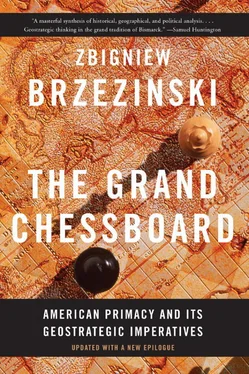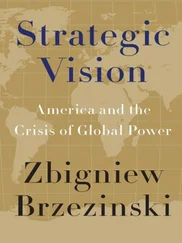Moreover, both France and Germany are powerful enough and assertive enough to exercise influence within a wider regional radius. France not only seeks a central political role in a unifying Europe but also sees itself as the nucleus of a Mediterranean–North African cluster of states that share common concerns. Germany is increasingly conscious of its special status as Europe’s most important state—as the area’s economic locomotive and the emerging leader of the European Union (EU). Germany feels it has a special responsibility for the newly emancipated Central Europe, in a manner vaguely reminiscent of earlier notions of a German-led Mitteleuropa. Moreover, both France and Germany consider themselves entitled to represent European interests in dealings with Russia, and Germany even retains, because of its geographic location, at least theoretically, the grand option of a special bilateral accommodation with Russia.
In contrast, Great Britain is not a geostrategic player. It has fewer major options, it entertains no ambitious vision of Europe’s future, and its relative decline has also reduced its capacity to play the traditional role of the European balancer. Its ambivalence regarding European unification and its attachment to a waning special relationship with America have made Great Britain increasingly irrelevant insofar as the major choices confronting Europe’s future are concerned. London has largely dealt itself out of the European game.
Sir Roy Denman, a former British senior official in the European Commission, recalls in his memoirs that as early as the 1955 conference in Messina, which previewed the formation of a European Union, the official spokesman for Britain flatly asserted to the assembled would-be architects of Europe:
The future treaty which you are discussing has no chance of being agreed; if it was agreed, it would have no chance of being applied. And if it was applied, it would be totally unacceptable to Britain…. au revoir et bonne chance. [2]
More than forty years later, the above dictum remains essentially the definition of the basic British attitude toward the construction of a genuinely united Europe. Britain’s reluctance to participate in the Economic and Monetary Union, targeted for January 1999, reflects the country’s unwillingness to identify British destiny with that of Europe. The substance of that attitude was well summarized in the early 1990s as follows:
• Britain rejects the goal of political unification.
• Britain favors a model of economic integration based on free trade.
• Britain prefers foreign policy, security, and defense coordination outside the EC [European Community] framework.
• Britain has rarely maximized its influence with the EC. [3]
Great Britain, to be sure, still remains important to America. It continues to wield some degree of global influence through the Commonwealth, but it is neither a restless major power nor is it motivated by an ambitious vision. It is America’s key supporter, a very loyal ally, a vital military base, and a close partner in critically important intelligence activities. Its friendship needs to be nourished, but its policies do not call for sustained attention. It is a retired geostrategic player, resting on its splendid laurels, largely disengaged from the great European adventure in which France and Germany are the principal actors.
The other medium-sized European states, with most being members of NATO and/or the European Union, either follow America’s lead or quietly line up behind Germany or France. Their policies do not have a wider regional impact, and they are not in a position to alter their basic alignments. At this stage, they are neither geostrategic players nor geopolitical pivots. The same is true of the most important potential Central European member of NATO and the EU, namely, Poland. Poland is too weak to be a geostrategic player, and it has only one option: to become integrated into the West. Moreover, the disappearance of the old Russian Empire and Poland’s deepening ties with both the Atlantic alliance and the emerging Europe increasingly give Poland historically unprecedented security, while confining its strategic choices.
Russia, it hardly needs saying, remains a major geostrategic player, in spite of its weakened state and probably prolonged malaise. Its very presence impacts massively on the newly independent states within the vast Eurasian space of the former Soviet Union. It entertains ambitious geopolitical objectives, which it increasingly proclaims openly. Once it has recovered its strength, it will also impact significantly on its western and eastern neighbors. Moreover, Russia has still to make its fundamental geostrategic choice regarding its relationship with America: is it a friend or foe? It may well feel that it has major options on the Eurasian continent in that regard. Much depends on how its internal politics evolve and especially on whether Russia becomes a European democracy or a Eurasian empire again. In any case, it clearly remains a player, even though it has lost some of its “pieces,” as well as some key spaces on the Eurasian chessboard.
Similarly, it hardly needs arguing that China is a major player. China is already a significant regional power and is likely to entertain wider aspirations, given its history as a major power and its view of the Chinese state as the global center. The choices China makes are already beginning to affect the geopolitical distribution of power in Asia, while its economic momentum is bound to give it both greater physical power and increasing ambitions. The rise of a “Greater China” will not leave the Taiwan issue dormant, and that will inevitably impact on the American position in the Far East. The dismantling of the Soviet Union has also created on the western edge of China a series of states, regarding which the Chinese leaders cannot be indifferent. Thus, Russia will also be much affected by China’s more active emergence on the world scene.
The eastern periphery of Eurasia poses a paradox. Japan is clearly a major power in world affairs, and the American-Japanese alliance has often—and correctly—been defined as America’s most important bilateral relationship. As one of the very top economic powers in the world, Japan clearly possesses the potential for the exercise of first-class political power. Yet it does not act on this, eschewing any aspirations for regional domination and preferring instead to operate under American protection. Like Great Britain in the case of Europe, Japan prefers not to become engaged in the politics of the Asian mainland, though at least a partial reason for this is the continued hostility of many fellow Asians to any Japanese quest for a regionally preeminent political role.
This self-restrained Japanese political profile in turn permits the United States to play a central security role in the Far East. Japan is thus not a geostrategic player, though its obvious potential for quickly becoming one—especially if either China or America were suddenly to alter its current policies—imposes on the United States a special obligation to carefully nurture the American-Japanese relationship. It is not Japanese foreign policy that America must watch, but it is Japan’s self-restraint that America must very subtly cultivate. Any significant reduction in American-Japanese political ties would impact directly on the region’s stability.
The case for not listing Indonesia as a dynamic geostrategic player is easier to make. In Southeast Asia, Indonesia is the most important country, but even in the region itself, its capacity for projecting significant influence is limited by the relatively underdeveloped state of the Indonesian economy, its continued internal political uncertainties, its dispersed archipelago, and its susceptibility to ethnic conflicts that are exacerbated by the central role exercised in its internal financial affairs by the Chinese minority. At some point, Indonesia could become an important obstacle to Chinese southward aspirations. That eventuality has already been recognized by Australia, which once feared Indonesian expansionism but lately has begun to favor closer Australian-Indonesian security cooperation. But a period of political consolidation and continued economic success is needed before Indonesia can be viewed as the regionally dominant actor.
Читать дальше












